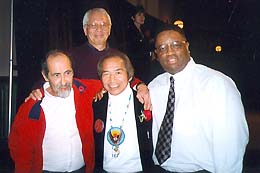On March 23-29, 1992, Seattle activists Larry Gossett (b. 1945), Roberto Maestas (1938-2010), Robert "Bob" Santos (1934-2016), and Bernie Whitebear (1937-2000), known as the Gang of Four, join Children's Hospital official Cheryl Ellsworth on a cultural exchange to Japan, called the Mutual Exchange and Education Tour (M*E*E*T). The trip focuses on grassroots democracy and Japan-U.S. relationships. The Japanese Ministry of Foreign Affairs sponsors the exchange, and the Japan Foundation Center for Global Partnership and the Sedaka Foundation of Seattle both fund it.
Activists Abroad
The early 1990s was a period of strained relations between Japan and the United States. Japan bashing first appeared in 1960s, the days of Japan Inc., when Sony bought Columbia Pictures, and in the 1990s Americans were buying more Toyotas, Hondas, and Sony TVs than ever before. The Mutual Exchange and Education Tour was designed to promote better understanding between Japan's and America's grassroots communities.
The tour included stops in Tokyo, Kyoto, and Kobe. Five speakers talked about their various constituencies and about "how grassroots communities in the greater Seattle area have survived and thrived in a growing multicultural society," said Theresa Fujiwara, president of the Sedaka Foundation at the time and a tour organizer (Sedaka World). Fujiwara also organized a M*E*E*T trip with a similar group from San Francisco.
The group from Seattle met with government and private officials, the press, and youth groups in a variety of formal and informal gatherings -- "an intense schedule," remembered Fujiwara (Chesley interview). The five speakers on that M*E*E*T trip were:
- Cheryl L. Ellsworth, community liaison, Children's Hospital and Medical Center, Seattle;
- Larry Gossett, onetime sixties political activist, then executive director of the Central Area Motivation Program (CAMP), who would go on to become a King County councilman in 1993;
- Roberto Maestas, who, in 1972, led the occupation of the old Beacon Hill Elementary School and transformed it into El Centro de la Raza (Center for the People) to serve the Latino community;
- Robert "Bob" Santos, executive director of Seattle's International District Improvement Association (Inter*Im); and
- Bernie Whitebear, an Indipino Native American activist who created the United Indians of All Tribes Foundation.
Gossett, Maestas, Santos, and Whitebear -- known as the Gang of Four, or Four Amigos -- had been leaders in the civil rights movements of their respective communities: African American, Latino, Asian American, and Native American. They had met, become allies, and formed Making Our Votes Count (MOVE), concluding that change would have to come through the ballot box rather than through confrontation. "We were close politically, but also socially. We liked each other," Santos said (Chesley interview). By the mid-1970s, the Gang of Four morphed into the Minority Executive Directors Coalition (MEDC) of King County, an umbrella group representing ethnic-minority communities. By the end of 2000, there would be some 120 community-based organizations in MEDC.
Voices from the Grassroots
Recalling the M*E*E*T exchange, Santos said, "We gave presentations on our roles in grassroots organizing, how we interfaced with the other major minority community groups, and how we formed the Minority Executive Directors Coalition." Among other issues discussed, Santos said, "Japan was hiring more foreign workers -- mostly Filipinos -- and wanted to figure out how best to work with these immigrants" (Chesley interview).
Gossett remembered that the people they met with in Japan "were interested in finding out how minority groups in the United States worked with one another and how they were treated by the United States [government]. We had very lively conversations in every city we visited, particularly with the youth coming up and talking to us ... We talked about the struggle ... to be accepted into mainstream American life and our struggle to empower ourselves so that we had more control over our destiny and to truly make our society a multiracial one that has a commitment to access for all" (Chesley interview).
In a special edition of Sedaka World, Fujiwara said the multicultural coalition building, as exemplified by the Gang of Four, "really took hold in Seattle, which has this unique sort of multicultural notion of bringing about cultural change and addressing community issues. Seattle also symbolizes the multicultural strength of a community working together" (Sedaka World).
This "continues to be true in the Northwest," Fujiwara said later. "The collaboration and coalition building -- you don't see that in other parts of the country" (Chesley interview). The M*E*E*T trip exemplified this spirit.

